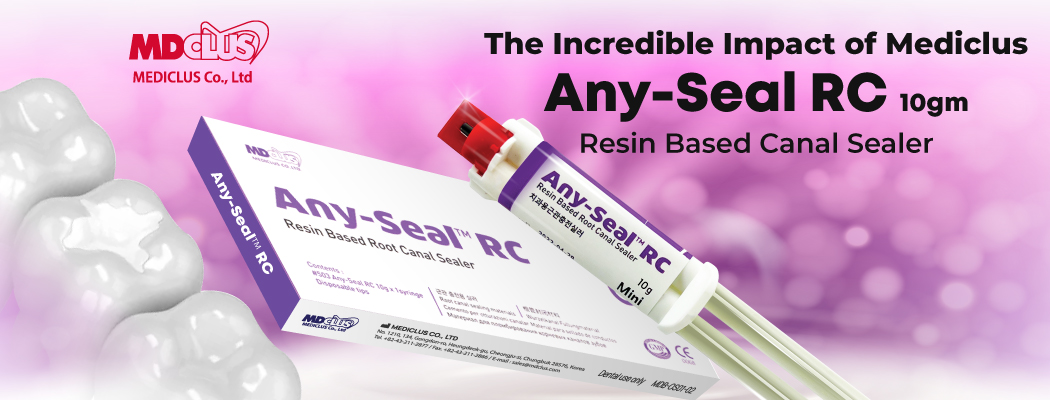A resin-based root canal sealer called Mediclus Anyseal RC is employed in endodontic therapy. It is a two-part sealant made up of a powder and a liquid that are combined to create a paste. The liquid comprises a plasticizer and a cross-linking agent, while the powder is made up of epoxy resin, calcium tungstate, and barium sulfate.
During root canal therapy, the area between the root canal walls and the gutta-percha (a substance used to fill the root canal space) is filled with Anyseal RC. It is renowned for its biocompatibility, low solubility, and great sealing abilities. In patients who have previously experienced adverse responses to epoxy resin or similar substances, it should be used with caution. Additionally, it must be used in accordance with the manufacturer's guidelines and under the guidance of a certified dental expert.
After a root canal operation, a tooth's root canal system is sealed and filled with materials called resin-based root canal sealers. Typically based on epoxy or methacrylate, these sealants are created from synthetic resins that are combined with a solvent to create a paste that can be applied to canal walls.
A resin-based canal sealer's primary function is to fill in the gaps and irregularities in the canal system, which stops bacteria and other microorganisms from getting inside and causing an infection or inflammation. Additionally, they aid in forming a hermetic seal that stops root canal fluid and gas escape.
The advantages of resin-based canal sealers over conventional sealers include increased sealing qualities, higher biocompatibility, and better adhesion to the canal walls. Additionally, they are less prone to contract or grow with age, which might lead to leaks and jeopardize the effectiveness of root canal surgery.
Overall, resin-based canal sealers are a crucial part of contemporary endodontic therapy because they offer a dependable and efficient technique to seal and fill the damaged tooth's root canal system and encourage healing and repair.
In order to preserve surfaces against stains, dampness, and other environmental variables, resin-based sealers are used as protective coatings. A resin, a synthetic chemical that can be generated from a number of sources, including plants, animals, and petroleum, is used to make this kind of sealer. Resin-based sealants can be used to protect a variety of surfaces, including concrete, wood, metal, and stone. They offer a strong, long-lasting barrier that can assist the surface they are applying to survive longer. Epoxy, polyurethane, and acrylic sealants are a few popular forms of resin-based sealers.
The precise product you're using and the surface you're putting it on will determine the best way to use a resin-based sealer. However, the following general procedures must be followed when applying a resin-based sealer:
- Clean the surface: Make sure the surface is clean and clear of debris, dust, and other contaminants before you seal it with a good cleaner, then allow it to completely dry
- Prepare the sealer: Follow the sealer's packaging instructions on the sealer's packaging to properly prepare it for usage. This could entail opening the container and stirring the contents or it could entail combining the resin with a hardener.
- Allow the sealer to dry: The sealer may need to dry for several hours or even overnight, depending on the product and the surface. To find out how long to let things dry, consult the manufacturer's directions.
- The second coat (optional): You might need to apply a second coat of sealant, depending on the product and the surface. Again, find out how long to wait before putting on the second coat from the manufacturer.
- Allow the sealer to cure: After the last coat has been applied you must give the sealer time to dry. Be careful not to use or expose the surface to water or other liquids during this time because it can take many days.
In order to get the greatest results from a resin-based sealer, it's crucial to thoroughly read and adhere to the manufacturer's recommendations.
A resin-based sealer called Anyseal RC is made to offer a variety of surfaces strong, long-lasting protection. The following are a few potential advantages of using Anyseal RC:
- Waterproofing: When Anyseal RC is applied to a surface, it forms a waterproof barrier that keeps moisture from reaching the surface and harming it.
- Stain resistance: Anyseal RC has excellent stain resistance, making it perfect for use on spill-prone surfaces like kitchen countertops and garage floors.
- Chemical resistance: Anyseal RC is suitable for use in industrial or manufacturing settings since it is resistant to a variety of chemicals, including acids and alkalis.
- UV resistance: UV inhibitors found in Anyseal RC aid to shield the surface from the sun's harmful UV rays.
- Abrasion resistance: Anyseal RC offers a strong layer of protection that is extremely resistant to abrasion, making it perfect for use in high-traffic areas like driveways or pathways.
- Easy application: You can quickly use the surface after using Anyseal RC because it dries quickly and is simple to apply with a brush, roller, or sprayer. Anyseal RC is an all-purpose resin-based sealer that can offer a variety of advantages to surfaces that require weather protection.










